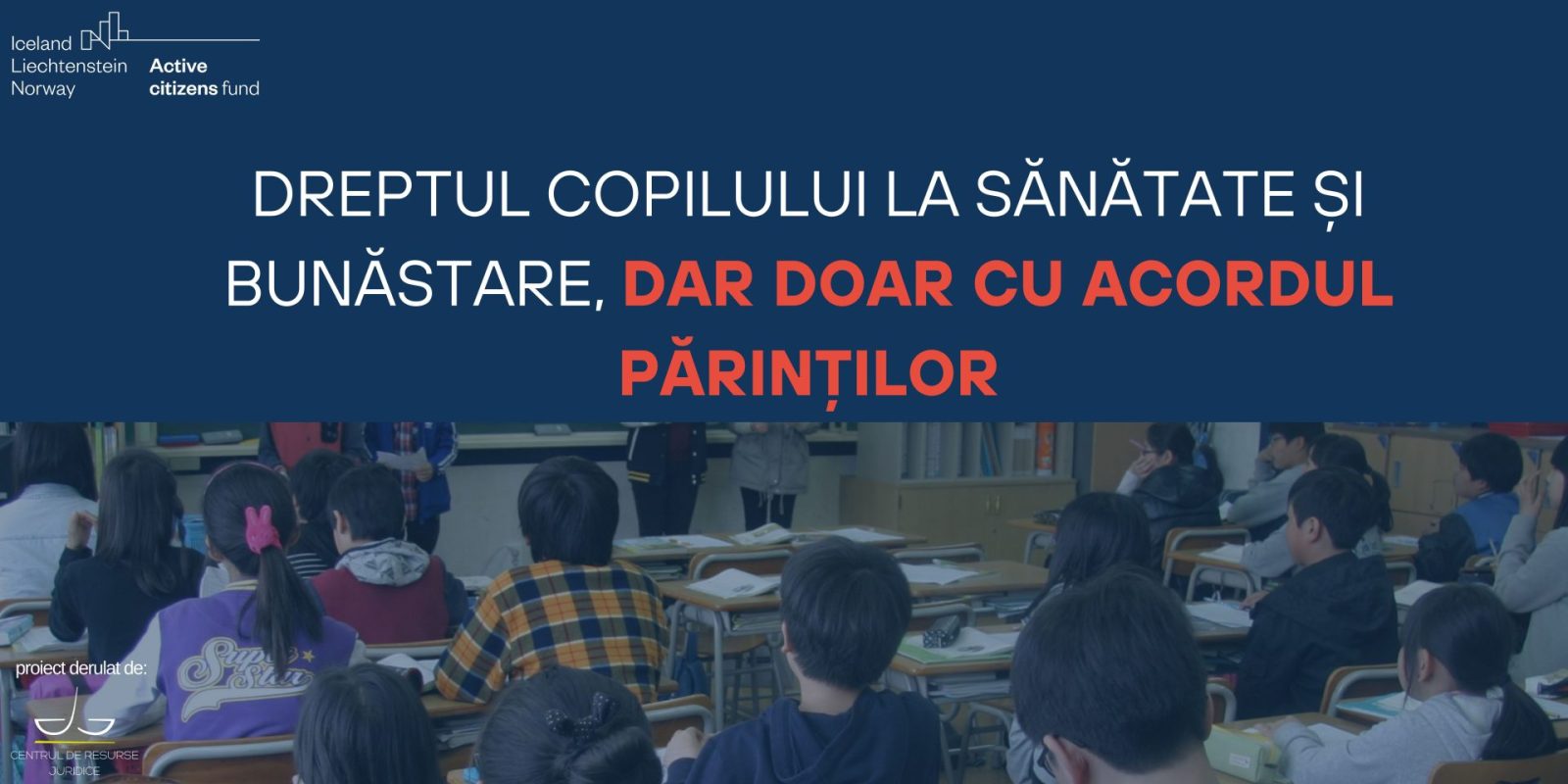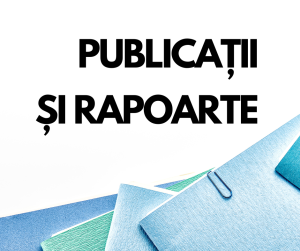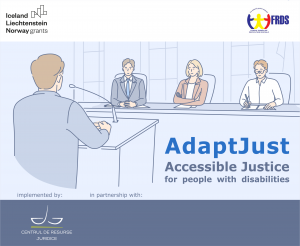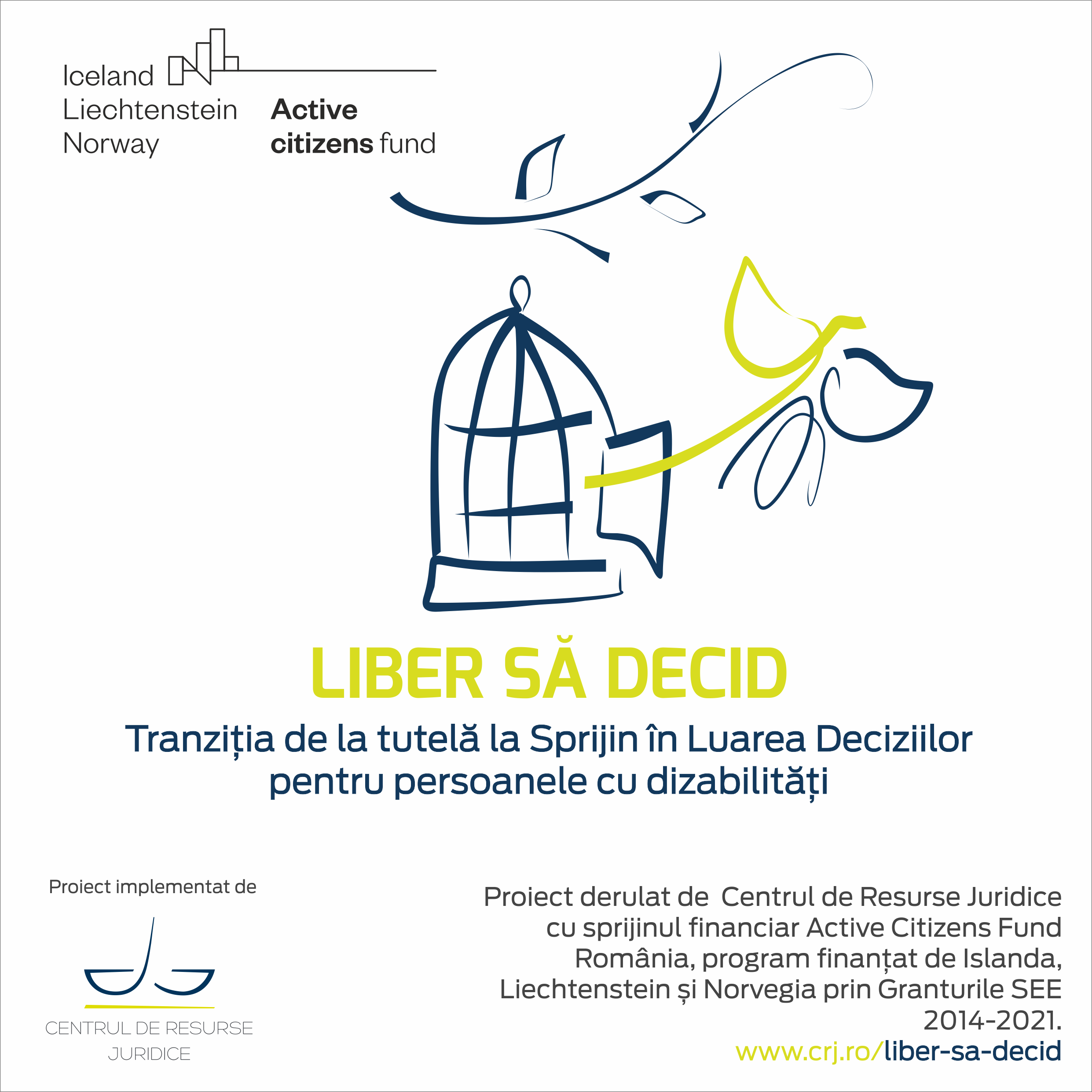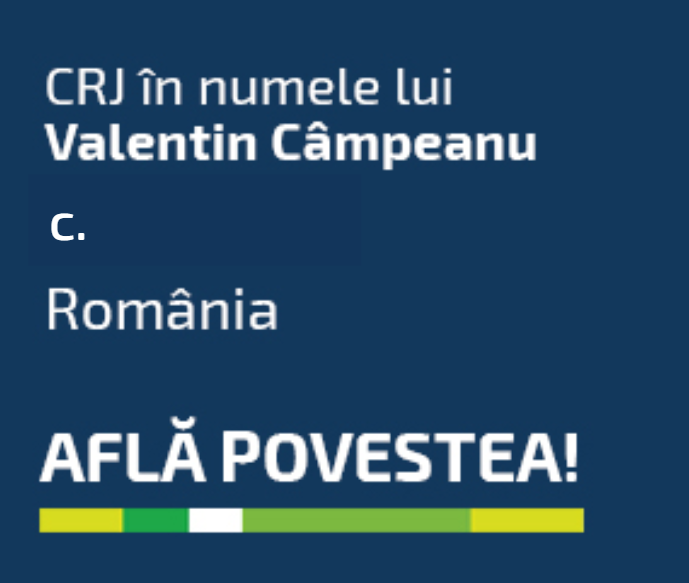About a year ago, during a debate organized by Save the Children Romania and the Romanian Senate[1]the conclusions of an analysis were announced[2]regarding the situation of underage mothers in Romania. Perhaps the most worrying of the conclusions is that “45% of births registered among girls under the age of 15 in the European Union come from Romania”.
At that time, the Minister of Health stated the following: “I am convinced that we will be able to find a solution so that health education becomes a permanent discipline, adapted to any age”[3].
In July 2022, art. 46 – “Health and well-being of the child”[4]from Law no. 272/2004 on the protection and promotion of children’s rights was amended by Law no. 191/2022[5], so that sex education programs (which by Law no. 45/2020 were mandatory, at least once per semester) become health education programs and take place only with the written consent of the children’s parents or legal representatives.
In the explanatory statement of this amendment[6]it is noted that Romania has a large number of abortions and pregnancies among minors and that there is a need for health education, but this must be done in accordance with the international treaties in the matter to which Romania is a party, only with the consent of the parents or legal representatives of the children, referring to art. 2 of Additional Protocol no. 1 to the Convention, according to which “no one can be denied the right to education. The state, in exercising the functions it will assume in the field of education and training, will respect the right of parents to ensure this education and this learning according to their religious and philosophical convictions.”
The legislator’s reasoning is flawed from several points of view:
- First, the case-law of the European Court of Human Rights interprets and applies Article 2 of Additional Protocol No 1 to the Convention differently, resulting in a conclusion diametrically opposed to that of the legislator;
- Secondly, as long as compulsory education is involved, parents or their legal representative have the obligation to ensure the children’s participation in classes, in accordance with Article 14 of Law 198/2023;
- Thirdly, even if certain subjects in the school curriculum would require parental consent, this condition should not operate in a discretionary and abusive manner.
*
- The jurisprudence of the European Court of Human Rights (nor the Article 2 of Protocol No. 1 to the Convention) does not oblige states to obtain parental consent in order to include subjects such as sex education, health education, etc. in school programs.
Without proposing to make an exhaustive exposition of the Court’s decisions that analyze the way in which art. 2 of Protocol no. 1 to the Convention, we will focus on two of them, respectively Dojan and others v. Germany[7]and AR and LR v. Switzerland[8].
In the case of Dojan and others v. Germany, the Court considers that, by refusing the exemption from compulsory sex education courses, the national authorities did not exceed the margin of appreciation granted to them within the scope of Article 2 of Additional Protocol No. 1.
In reaching this conclusion, the Court considers the following:
- „In fulfilling a natural duty to their children – being primarily responsible for the ‘education and teaching’ of their children – parents can demand from the state that their religious and philosophical beliefs be respected. Their right thus corresponds to a responsibility closely related to the enjoyment and exercise of the right to education.” (…)
- „ However, the establishment and planning of the curriculum falls, in principle, within the competence of the contracting states.” (…)
- „The Court notes that the sex education classes in question aimed at the neutral transmission of knowledge regarding procreation, contraception, pregnancy and childbirth in accordance with legal provisions, subsequent guidance and the curriculum, which were based on current scientific and educational standards. The aim of the theater workshop “My body is mine” was to raise awareness of sexual violence and child abuse in order to prevent it.
- The Court notes that these objectives are in line with the principles of pluralism and objectivity enshrined in Article 2 of Protocol no. 1.” (…)
- „Furthermore, as the German courts also pointed out, the applicant parents were free to educate their children after school and on weekends, and therefore their right to educate their children in accordance with their religious beliefs was not restricted in a disproportionate manner. Compulsory primary school attendance does not deprive the plaintiff parents of their right “to exercise with respect to their children the natural parental functions as educators or to guide their children along a path according to the parents’ own religious or philosophical convictions”.
In the case of AR and LR v. Switzerland, the Court notes that the rejection of the request for exemption from these hours by the principal of the primary school constituted an interference in the applicant’s exercise of her rights protected by Article 8 of the Convention, but considers that this interference is provided for by law, is based on a legitimate aim and is necessary in a democratic society, so the Court rules that the Swiss authorities respected the margin of appreciation recognized by the Convention.
In reaching this conclusion, the Court considers the following:
- „The Court notes at the beginning that paragraph 2 of Article 62 of the Federal Constitution provides for compulsory education in public schools (paragraph 14 above). It follows from a reading of paragraph 66, paragraph 1, in conjunction with paragraph 22, of the Education Act of the Canton of Basel-Stadt (paragraph 15 above) that students are expected to participate in compulsory subjects, which include life sciences and earth sciences. In addition, Curriculum 91 (paragraph 16 above) clearly indicates that health education is part of the life and earth sciences courses and that health education includes sex education.” (…)
- „The Court acknowledges, in this respect, that the application of some of the aims pursued by sex education offered to under-age children may be controversial. That said, the Court points out that the text of the second paragraph of Article 8 of the Convention expressly refers to the protection of health. It notes that, according to the directive in question, one of the aims of sex education is the prevention of violence and sexual exploitation. It considers that sexual abuse is a real threat to the physical and moral health of children, against which they must be protected at all ages. It therefore considers that society undoubtedly has a particular interest in ensuring that very young children benefit from sex education. It also notes that another aspect, intrinsically linked to the very task of public education, namely preparing children for social realities, seems to militate in favor of sex education for very young children attending kindergarten, infants or primary school. Indeed, these children do not live in isolation, but are exposed to a multitude of external influences and information – including from the media – which can raise legitimate questions in them and make it necessary to confront them in a framed way with the subject in question.” (…)
- „Even taking into account the fact that the nature of the bond between parents and their young children requires special protection, the Court considers it appropriate to recall that the protection of parental education provided for in Article 5 of the Convention on the Rights of the Child is not an end in itself, but must to always serve the well-being of the child. This observation follows from the very text and spirit of the said convention. Indeed, through Article 29, letter d), the States Parties to the Convention agree that education must aim at preparing the child to assume the responsibilities of life in a free society. Also, article 19 of this convention obliges the states parties to take “all measures”, especially “educational” measures, to “protect the child against any form of physical or mental violence, attack or brutality (…), including sexual violence” . The Court considers that, as demonstrated above (paragraphs 34-35), school sex education as practiced in the canton of Basel-Stadt pursues these aims.” (…)
- „Finally, the Court notes the seriousness with which the competent authorities treated the sensitive subject of sex education. Indeed, it appears in particular from the directive, especially in its amended form, and from the aforementioned recommendations, which provide in detail for sex education lessons adapted to the age and gender of the children, that the Swiss authorities have shown great composure in the face of different interests at stake. This observation also applies to the concrete case of the applicants, in which the cantonal authorities and domestic courts have issued very well-reasoned decisions that take into account the interests of the child, while also recognizing the essential role of parents in the education of their children, including in matters of sexual education.”
As such, as can be seen, the ECHR jurisprudence in the matter results in a conclusion opposite to that intended by the legislator when he amended art. 46 of Law no. 272/2004. The introduction of sex education programs into school programs and the participation of students in them can be done without obtaining the parents’ consent, without violating art. 2 of Additional Protocol no. 1 to the Convention.
- Pre-university education law no. 198/2023 imposes on parents (or legal representatives) the obligation to ensure the participation of children in classes during the entire period of compulsory education.
By art. 14 of Law no. 198/2023, parents are obliged to ensure children’s participation in classes throughout the period of compulsory education, and failure to comply with this obligation is a contravention.
Also, art. 88, para. (10) from Law no. 198/2023 stipulates that “Education framework plans and school programs for study subjects and mandatory training modules in pre-university education must consider including the following topics: education for the environment and climate change, health education, notions for first aid, financial education, legal education, entrepreneurial education, technological education, traffic education, civic education, local history and civilization, intercultural education, education for democratic citizenship, equal opportunities, ethics, critical thinking, oratory and personal development, education for European citizenship, cyber security, education for healthy eating.”
As such, health education is part of the subjects that must be included in pre-university education, and correlated with art. 14 of the same law, parents are obliged to ensure children’s participation in classes, otherwise committing a misdemeanor.
Or, under the given conditions, we appreciate that there is a contradiction between art. 14, in conjunction with art. 88 para. (10) from Law no. 198/2023, on the one hand and art. 46 of Law no. 272/2004, on the other hand.
At the same time, we appreciate that the rule imposed by the legislator in art. 46 of Law no. 272/2004 creates a dangerous precedent, even if it currently only concerns health education programs. Thus, if we admit that a compulsory subject from school programs can be studied by children only with the consent of their parents, the consequences are as follows:
- We admit, de plano, an absolute right of parents to decide the content of school programs according to their religious and philosophical beliefs, at the expense of the child’s right to education and health;
- We admit that, on the basis of the same reasoning, parents should decide according to their religious and philosophical beliefs and in relation to the participation of children in other subjects as well, such as biology, history or physics.
Of course, none of the two conclusions is in accordance with the principles established by the European Court of Human Rights in the cases presented previously. Such conclusions cannot be accepted, as they are likely to affect children’s right to an education in accordance with the principles and values of a democratic society, which aims at the harmonious development of children in all respects.
- The current regulation of art. 46 of Law no. 272/2004 on the protection and promotion of children’s rights establishes a discretionary and arbitrary procedure in ensuring the child’s right to education and health.
Even to the extent that we admit that requesting parental consent would be a procedure in accordance with the Convention, we appreciate that this should not represent an unjustified obstacle to children’s access to education.
In this sense, as we showed previously, the Court ruled that “the protection of parental education is not an end in itself”, but must always serve the well-being of the child. In other words, the children’s right to education and health must be balanced with the parents’ right to apply their own religious and philosophical beliefs in the children’s education, and of these two, the first should be given, considering the best interest of the child.
Moreover, art. 263 Civil Code. requires that any measure concerning the child, regardless of its author, must be taken with respect to the best interest of the child. In addition, art. 29 of Law no. 272/2004 states that if he is capable of discernment, the child has the right to freely express his opinion on any issue that concerns him and that in any judicial or administrative procedure that concerns him, the child has the right to be heard and that his opinions shall be considered and given due weight in relation to his age and degree of maturity.
However, the procedure in art. 46 of Law no. 272/2004 does not consider the child’s opinion in any form, not even consultative, the consequence being that the child’s participation in health education programs is decided exclusively by the parent. Of course, the presumption in this matter is that the parent knows best the needs of his child and is able to make the right choices for him, but as in any other decision made regarding the child, he should operate the same protection and control mechanisms for to prevent and remedy cases where the parent’s decisions are abusive or unsuitable for the child’s needs.
In other words, the procedure established by art. 46 of Law no. 272/2004 is not likely to ensure that parents’ decisions regarding children’s participation in health education programs are taken in compliance with the principle of the best interests of the child and to provide for mechanisms to censure these purely discretionary decisions if they are used abusively. However, in this situation, the question arises whether art. 46 of Law no. 272/2004 contradicts art. 95 of Law no. 272/2004[9], taking into account that it allows parents to deprive their children of the right to education and health, without coming up with any justification, without motivating their decisions, without even knowing if the decision is based on religious or philosophical beliefs or anything else.
***
Beyond the content of the law and its interpretation in relation to the European Convention on Human Rights, it becomes difficult to deny the wave of statistics, criminal files, news that do nothing but prove the need for mechanisms, as many and as varied, to fight sexual abuse against minors, pregnancy among minors and the vulnerability of minors due to lack of knowledge on the matter.
While we are debating these things, in Romania cases like the one of the minor who ended up in hospital after giving birth and killed her newborn for fear of making her situation public[10] are not isolated. Of course we can start by expressing opinions about the responsible persons, then deny the existence of a problem just because we have never personally faced such situations. However, perhaps the most eloquent opinion on this case is that of the mayor of the locality, a former teacher at the school where the minor in question was studying, who said that “she was a very good student” and that “probably the lack of communication, fear, lack of sexual education led to this tragedy”.
As such, just because parents believe that their children are not yet ready to study sex education at school does not mean that this is actually the case. Of course, studying sex education at school will not solve all the problems of teenagers, but it is certainly a useful tool in equipping them to face the reality of today’s world.
__________________________________________________
Author: lawyer Irina Mihale
[1] Attended by representatives of the following institutions: the Ministry of Health, the Ministry of Health of the Republic of Moldova, the Romanian Senate, the Chamber of Deputies, the Presidential Administration, the Prime Minister’s Chancellery and the National Authority for the Protection of Children’s Rights and Adoption – ANPDCA;
[2] Analysis available on salvaticopiii.ro, URL: www.salvaticopiii.ro/sites/ro/files/2023-11/studiu-mame-minore-statistici-si-solutii.pdf, accessed on December 10th, 2023;
[3] Idem;
[4] Article of Law No 272/2004 (as amended by Law No 191/2022)
“(1) The child has the right to enjoy the highest attainable standard of health and to benefit from the medical and rehabilitation services necessary to ensure the effective realization of this right. (3) The specialized bodies of the central public administration, the local public administration authorities, as well as any other public or private institutions with responsibilities in the field of health and education are obliged to adopt, under the conditions of the law, all measures necessary to:
i) systematic health education programs in schools, starting from the 8th grade, with the written consent of the parents or legal representatives of the children, in order to prevent the contraction of sexually transmitted diseases and pregnancy of minors;”
[5] published in Official Gazette no 652 of June 30th, 2022;
[6] „(…) Romania has a high number of abortions and pregnancies among minors, we recognize the need for health education in order to prevent pregnancy among minors and the contraction of sexually transmitted diseases. However, this must be done in accordance with the relevant international treaties to which Romania is a party, only with the consent of the parents or legal representatives of the children, according to their values and moral criteria. The European Convention on Human Rights states in Article 2 (right to education) of its first Additional Protocol that “the State, in the exercise of its functions in the field of education and teaching, shall respect the right of parents to ensure such education and teaching in conformity with their religious and philosophical convictions.” (similar provisions in Art. 26 par. 3 of the Universal Declaration of Human Rights and Art. 13 par. 3 of the International Covenant on Economic, Social and Cultural Rights).”, document available on the website of the Chamber of Deputies, URL: www.cdep.ro/comisii/munca/pdf/2020/ri457_19.pdf accessed on December 10th, 2023;
[7] ECHR judgment of 13.09.2011 in Dojan and Others v. Germany, available at URL: https://hudoc.echr.coe.int/eng?i=001-106382, accessed on December 10th, 2023;
[8] ECHR judgment of 19.12.2017 in A.R. and L.R. v. Switzerland, available at URL: https://hudoc.echr.coe.int/?i=001-180402, accessed on December 10th, 2023;
[9] Article 95 of Law No 272/2004
„It is forbidden to commit any act of violence, as well as to deprive the child of his/her rights in such a way as to endanger the child’s life, physical, mental, spiritual, moral or social development, bodily integrity, physical or mental health, both in the family and in institutions providing for the protection, care and education of children, in health establishments, educational establishments, as well as in any other public or private institution providing services or carrying out activities with children.”
[10] See www.libertatea.ro/stiri/o-eleva-premianta-a-ajuns-la-spitalul-din-vaslui-acuzand-dureri-menstruale-medicii-au-anuntat-imediat-politia-dupa-ce-si-au-dat-seama-de-cauza-4665845

